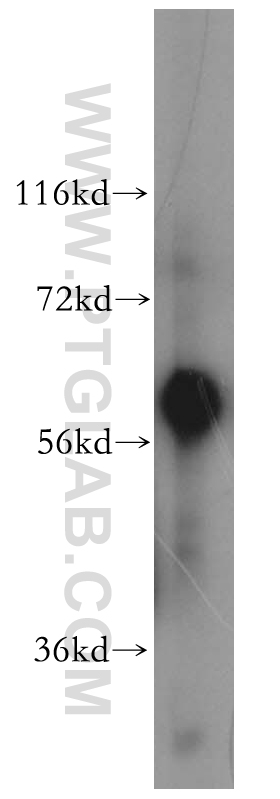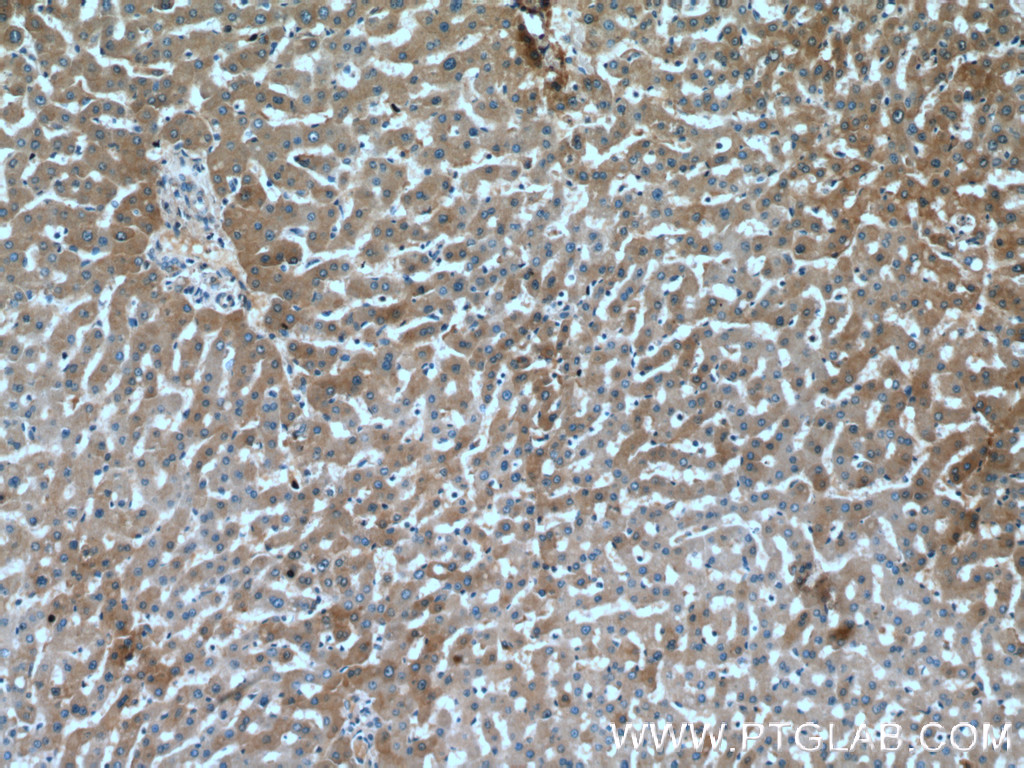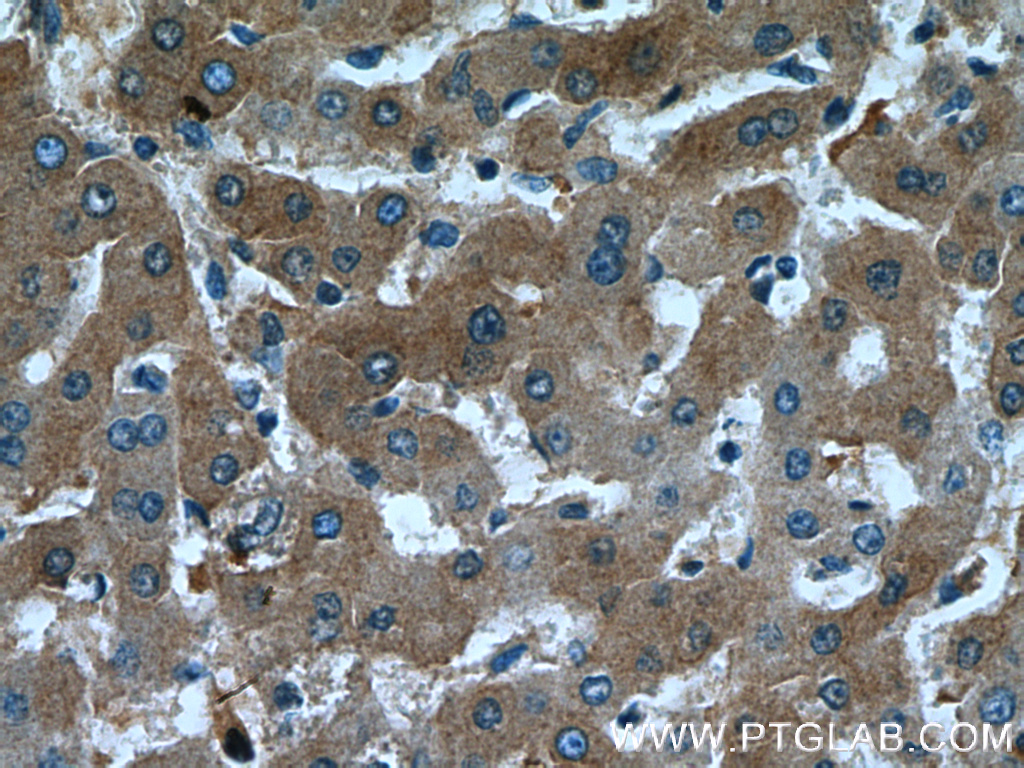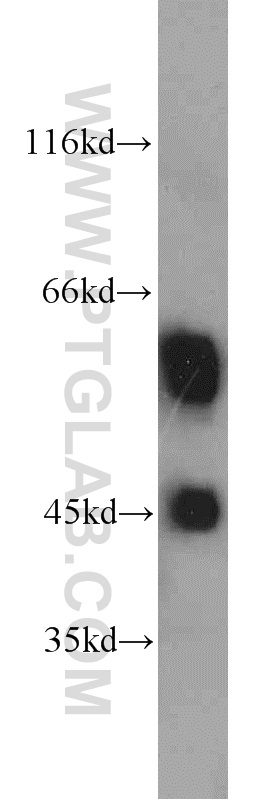验证数据展示
经过测试的应用
| Positive WB detected in | human liver tissue, human heart tissue |
| Positive IHC detected in | human liver tissue Note: suggested antigen retrieval with TE buffer pH 9.0; (*) Alternatively, antigen retrieval may be performed with citrate buffer pH 6.0 |
推荐稀释比
| 应用 | 推荐稀释比 |
|---|---|
| Western Blot (WB) | WB : 1:500-1:1000 |
| Immunohistochemistry (IHC) | IHC : 1:50-1:500 |
| It is recommended that this reagent should be titrated in each testing system to obtain optimal results. | |
| Sample-dependent, Check data in validation data gallery. | |
产品信息
16571-1-AP targets Fetuin-A/AHSG in WB, IHC, IF, ELISA applications and shows reactivity with human samples.
| 经测试应用 | WB, IHC, ELISA Application Description |
| 文献引用应用 | WB, IHC, IF |
| 经测试反应性 | human |
| 文献引用反应性 | human, mouse, rat, plasmodium falciparum |
| 免疫原 |
CatNo: Ag9853 Product name: Recombinant human AHSG protein Source: e coli.-derived, PGEX-4T Tag: GST Domain: 1-367 aa of BC048198 Sequence: MKSLVLLLCLAQLWGCHSAPHGPGLIYRQPNCDDPETEEAALVAIDYINQNLPWGYKHTLNQIDEVKVWPQQPSGELFEIEIDTLETTCHVLDPTPVARCSVRQLKEHAVEGDCDFQLLKLDGKFSVVYAKCDSSPDSAEDVRKVCQDCPLLAPLNDTRVVHAAKAALAAFNAQNNGSNFQLEEISRAQLVPLPPSTYVEFTVSGTDCVAKEATEAAKCNLLAEKQYGFCKATLSEKLGGAEVAVTCTVFQTQPVTSQPQPEGANEAVPTPVVDPDAPPSPPLGAPGLPPAGSPPDSHVLLAAPPGHQLHRAHYDLRHTFMGVVSLGSPSGEVSHPRKTRTVVQPSVGAAAGPVVPPCPGRIRHFKV 种属同源性预测 |
| 宿主/亚型 | Rabbit / IgG |
| 抗体类别 | Polyclonal |
| 产品类型 | Antibody |
| 全称 | alpha-2-HS-glycoprotein |
| 别名 | AHSG, Fetuin-A, Alpha-2-HS-glycoprotein, Alpha 2 Z globulin, alpha 2 HS glycoprotein |
| 计算分子量 | 367 aa, 39 kDa |
| 观测分子量 | 58 kDa |
| GenBank蛋白编号 | BC048198 |
| 基因名称 | Fetuin-A |
| Gene ID (NCBI) | 197 |
| RRID | AB_2224119 |
| 偶联类型 | Unconjugated |
| 形式 | Liquid |
| 纯化方式 | Antigen affinity purification |
| UNIPROT ID | P02765 |
| 储存缓冲液 | PBS with 0.02% sodium azide and 50% glycerol, pH 7.3. |
| 储存条件 | Store at -20°C. Stable for one year after shipment. Aliquoting is unnecessary for -20oC storage. |
背景介绍
Fetuin-A, also named as Alpha2-HS glycoprotein (AHSG), is a member of cystatin superfamily of protease inhibitors. It is a highly expressed glycoprotein in various fetal tissues whereas it is mainly expressed by the liver in adults. Fetuin A, an extracellular inhibitor of transforming growth factor β, is a profibrogenic stimulus in liver disease. Circulating fetuin-A may be a beneficial serum biomarker in the detection of liver and vascular fibrosis progression in patients with non-alcoholic fatty liver disease. It is also involved in several functions, such as endocytosis, brain development and the formation of bone tissue. Fetuin-A exerts its effects on the cardiovascular system by two different mechanisms. On the one hand it inhibits ins signaling and induces ins resistance contributing to the onset of atherosclerosis and on the other hand it inhibits calcium deposition and protects from vascular calcification.
实验方案
| Product Specific Protocols | |
|---|---|
| IHC protocol for Fetuin-A/AHSG antibody 16571-1-AP | Download protocol |
| WB protocol for Fetuin-A/AHSG antibody 16571-1-AP | Download protocol |
| Standard Protocols | |
|---|---|
| Click here to view our Standard Protocols |
发表文章
| Species | Application | Title |
|---|---|---|
Front Cell Dev Biol Plasma Exosomes Derived From Patients With End-Stage Renal Disease and Renal Transplant Recipients Have Different Effects on Vascular Calcification. | ||
Osteoarthritis Cartilage Proteomics analysis of hip articular cartilage identifies differentially expressed proteins associated with osteonecrosis of the femoral head. | ||
J Pharm Biomed Anal Integrated cartilage metabolomics and proteomics analysis reveals the therapeutic effect of Wenjing Tongluo Decoction on Knee osteoarthritis rats | ||
Malar J The malaria parasite Plasmodium falciparum in red blood cells selectively takes up serum proteins that affect host pathogenicity. | ||
Bioengineered Alpha-2 Heremans Schmid Glycoprotein (AHSG) promotes the proliferation of bladder cancer cells by regulating the TGF-β signalling pathway. | ||
Adv Sci (Weinh) 3D-hUMSCs Exosomes Ameliorate Vitiligo by Simultaneously Potentiating Treg Cells-Mediated Immunosuppression and Suppressing Oxidative Stress-Induced Melanocyte Damage |





